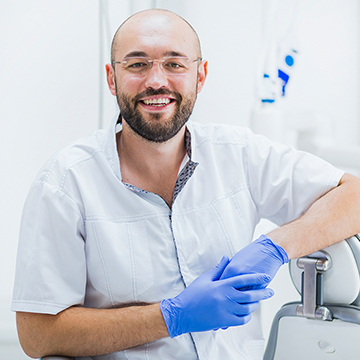Restorative Dentistry in Madison, WI
Restorative Fillings
A filling is used to repair a tooth affected by dental decay (cavity), chipped teeth, and, at times, to close the space between teeth. There are two types of filling material that can restore teeth. Composite fillings match the color of the natural teeth structure and are the most widely-used filling material. Occasionally, an amalgam (silver) filling may be used to restore posterior teeth.
Dr. Greene will take the time to explain his recommendations to you and address any questions you may have about the recommended fillings. If you suspect you may have a cavity, click here to request an evaluation.
Dental Crowns
A crown is used to cover or “cap” a tooth that has been damaged beyond the point that a filling can restore the tooth to health. A crown strengthens a damaged tooth and can improve the appearance, shape, or alignment of the tooth or teeth. A crown can also be placed on a dental implant to restore appearance and function to a single tooth or multiple teeth.
A crown may be recommended in the following situations:
- Replacement of a large filling when there isn’t adequate tooth structure remaining
- Protect a tooth that has been weakened by a crack or fracture
- Support a bridge (see Dental Bridge Work section below)
- Restore a dental implant
- Restore a tooth that is discolored or poorly shaped
- Strengthen and protect a tooth that has had root canal treatment
Dr. Hill will discuss the best treatment with you and address any questions about the crown. Click here to schedule an appointment.
Dental Bridge Work
A bridge does exactly what the name implies: it fills a space between two teeth. A bridge can replace one or more missing teeth, is attached to the teeth on either side of the space and an artificial tooth fills the space of the missing tooth or teeth.
Missing teeth can shift the adjacent teeth into the space, which can cause alteration to your natural bite. A bridge can prevent teeth from shifting, restore full chewing function, and improve appearance.
To learn more about bridgework, click here to schedule an appointment.
Dentures
Dentures are natural-looking replacements for missing teeth. Dentures can replace a few missing teeth (partial denture) or a full arch of missing teeth (full denture). Dentures are made to match the color and shape of the natural teeth.
Both partial and full dentures restore appearance and function, altered when you have missing teeth. Dr. Greene enjoys working with patients who need dentures to find their desired look and fit. He takes the time to listen to patients and create the outcome they hope for.
To learn more about dentures in Madison, click here to request a consultation.
Root Canal Therapy
No need to fear! Root canals may get a really bad rap, but they’re not so bad–especially in the hands of the gentle and professional team at Madison Lakes Dental. A root canal is indicated
when a tooth has become infected. The nerve and pulp of a tooth are in the center of the root and, when infected, must be removed and the space cleaned and sealed.
Symptoms that may indicate that a root canal is a necessary include:
- Spontaneous pain
- Pain when pressure is applied to your teeth, such as when chewing
- Intolerance to hot and cold temperatures
- Swelling in the gum tissue near a tooth
Dr. Hill and his team will ensure your comfort throughout the procedure, including explaining each process step. If you are experiencing any of the symptoms listed above, contact our office right away to schedule an appointment.
Tooth Extractions
Some conditions require the removal (extraction) of a tooth. Some examples include:
- A filling or crown cannot restore a tooth due to extensive damage
- A tooth cannot be saved by root canal treatment due to advanced infection
- Tooth has sustained severe bone loss due to periodontal disease
- Crowding of teeth impacts health or function
- Inadequate space for wisdom teeth
Dr. Greene will evaluate your condition and recommend that it is best for your needs. Extractions can be done with a local anesthetic right in our office or, in more advanced situations, can be referred to an oral surgeon specializing in extractions.
If you think you or a family member may need to have a tooth extracted, please request an appointment so Dr. Greene can perform a thorough examination and discuss options with you.



















